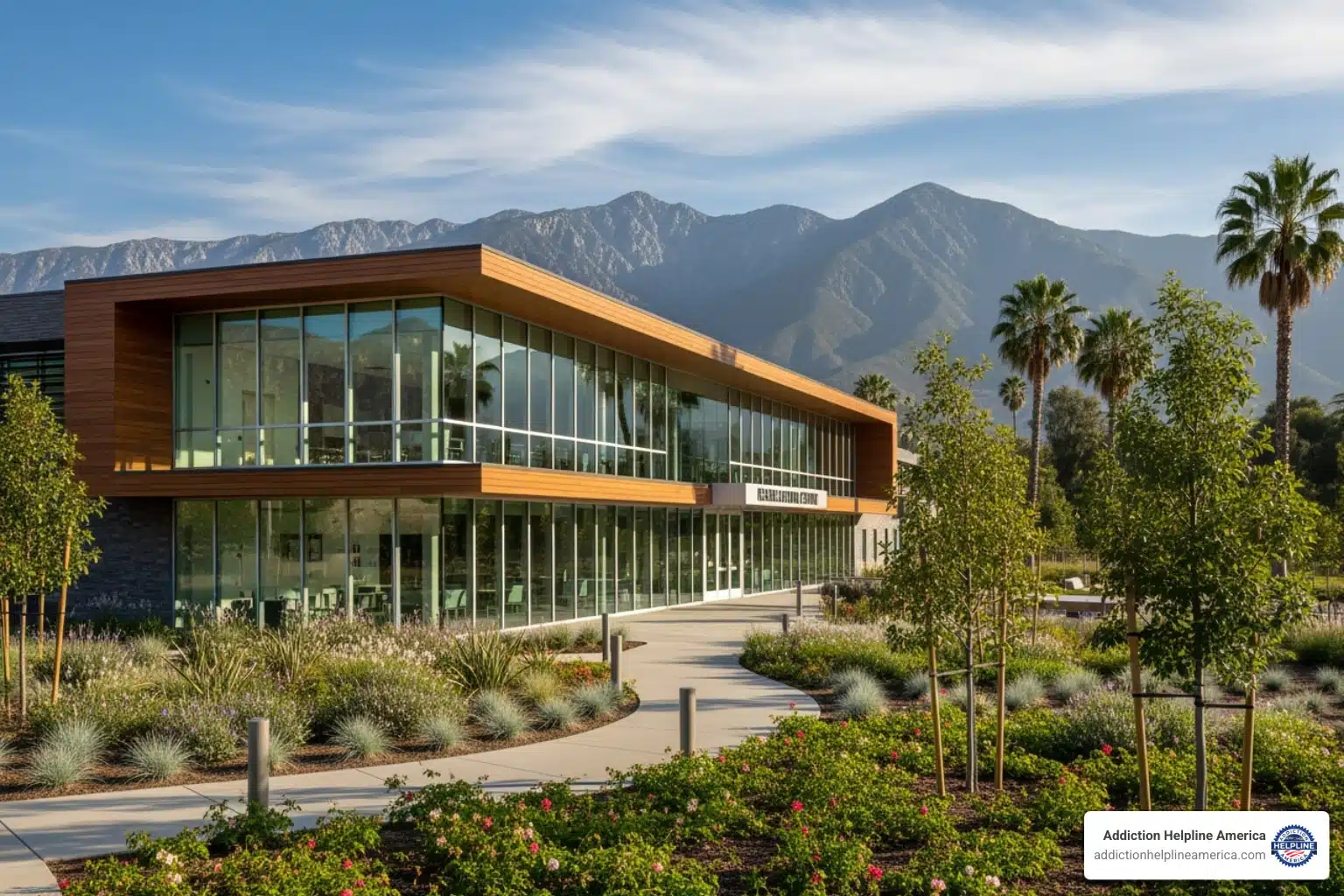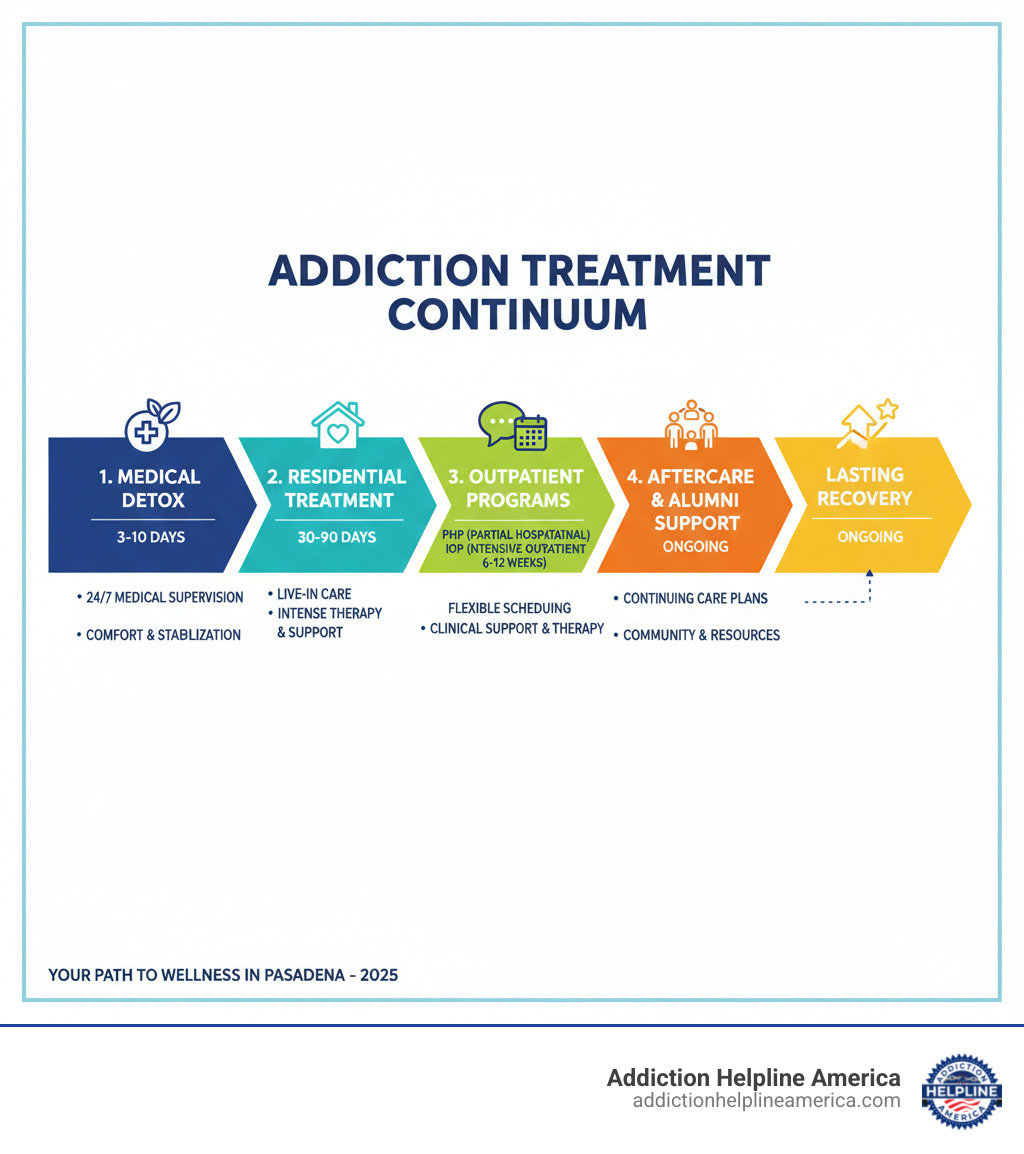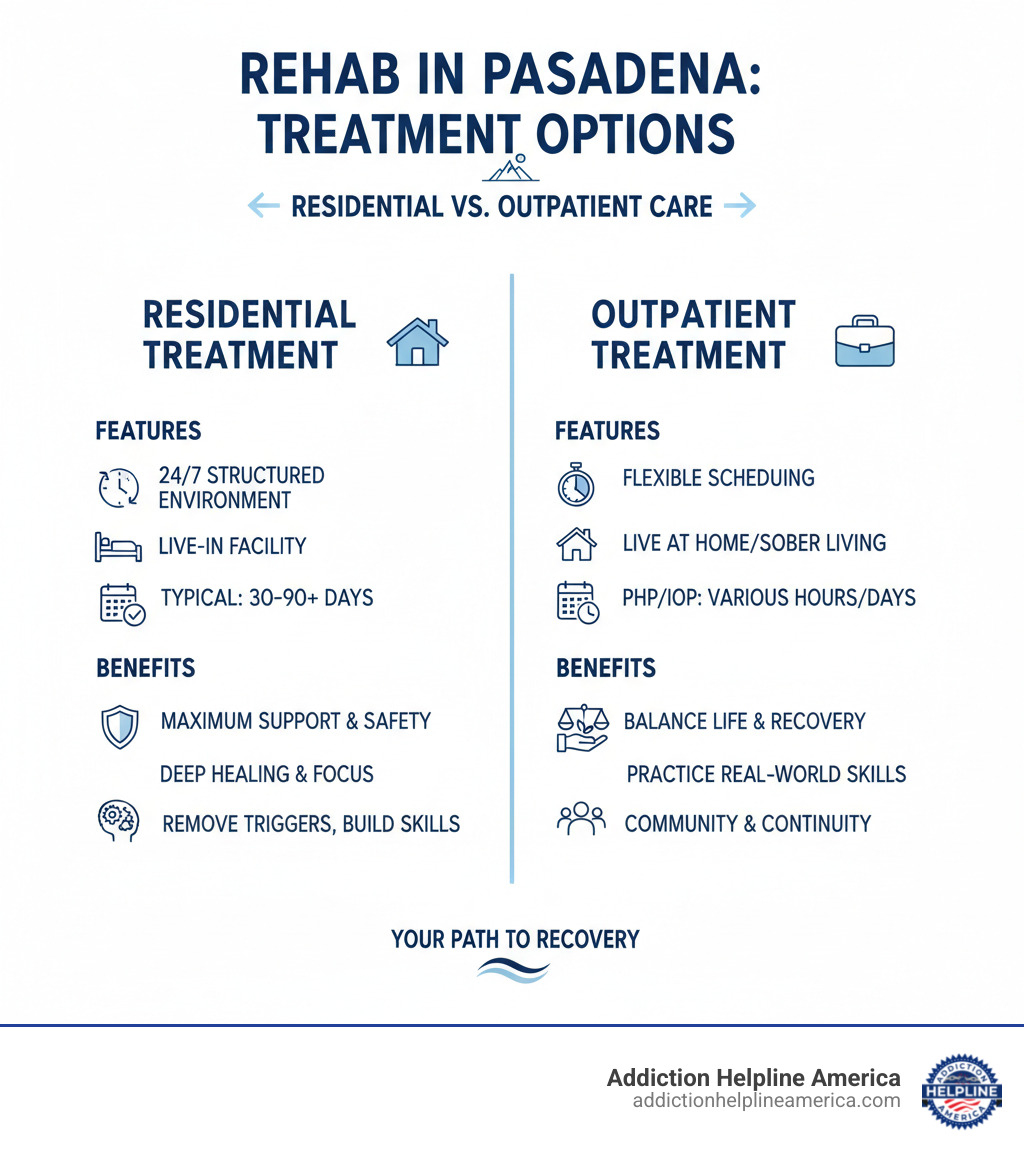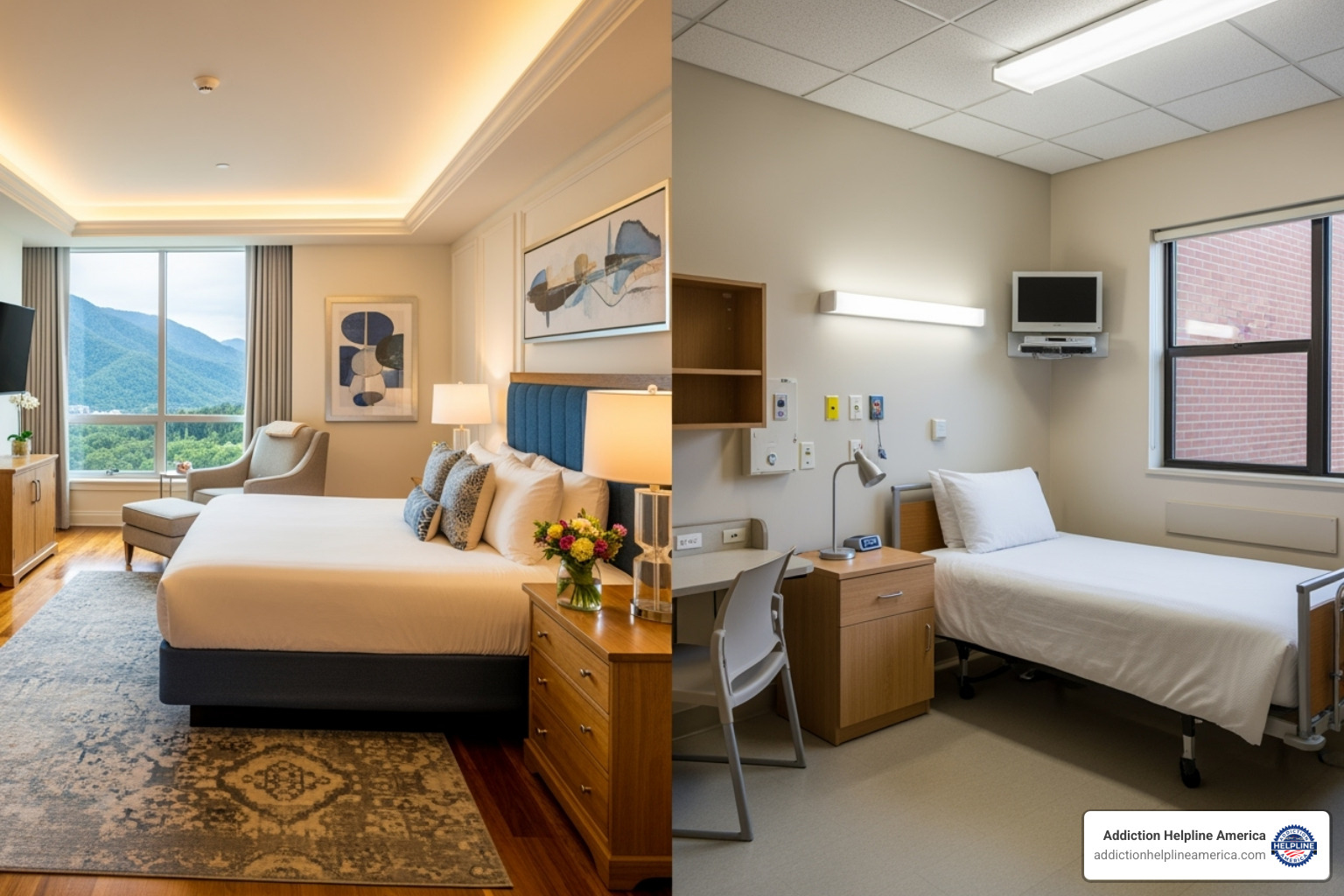
Finding Hope: Your Guide to Addiction Treatment in Pasadena
Rehab in Pasadena offers comprehensive addiction treatment through multiple levels of care including medical detox, residential programs, outpatient services, and aftercare support. The city hosts numerous accredited facilities providing evidence-based therapies, dual diagnosis treatment, and specialized programs for different populations.
Top Treatment Options in Pasadena:
- Medical Detox – 24/7 supervised withdrawal management
- Residential Treatment – 30-90 day inpatient programs with therapy
- Outpatient Programs – PHP and IOP for flexible scheduling
- Specialized Care – Programs for veterans, women, men, and dual diagnosis
- Payment Options – Insurance, Medi-Cal, sliding scale fees, and free programs
Addiction affects thousands of families across California. In 2022 alone, alcohol-impaired crashes killed more than 1,100 people in California, while drivers facing first-time DUI charges receive an average of $13,500 in fines. Yet recovery is absolutely possible with the right support and treatment.
Pasadena’s treatment landscape includes everything from luxury facilities like Annandale Behavioral Health to community-focused nonprofits like Impact Drug & Alcohol Treatment Center, which has served over 20,000 people since 1971. The city offers detox centers, residential programs, intensive outpatient services, and sober living homes – creating a complete continuum of care.
Finding the right facility can feel overwhelming when you’re in crisis. This guide breaks down Pasadena’s top rehab centers, explains different treatment levels, and helps you understand payment options so you can make an informed decision quickly.
At Addiction Helpline America, we’ve helped thousands of individuals and families steer the complex world of addiction treatment, including connecting people with quality rehab in Pasadena facilities that match their specific needs. Our 24/7 helpline provides confidential support to guide you toward the most appropriate level of care for lasting recovery.
Understanding the Different Levels of Addiction Care
Recovery isn’t a straight line, and treatment options aren’t one-size-fits-all. Think of addiction care as a staircase, with each step offering the right level of support when you need it most. Understanding these different levels of care will help you find the right rehab in Pasadena for your unique situation.
Modern addiction treatment is flexible. Some people need intensive, around-the-clock medical support, while others thrive with part-time programs that let them keep working or caring for family. There’s no shame in needing more support or in being ready for more independence. It’s all about meeting you where you are today.
Medical Detox: The First Step to Safety
Withdrawal can be scary. Your body has become dependent on substances and needs time to readjust after you stop using. Medical detox is the most important safety net in early recovery.
Medical detox isn’t about suffering through withdrawal alone. Instead, a medical team watches over you 24/7, ensuring your safety and comfort. At facilities like Impact Drug & Alcohol Treatment Center and Annandale Behavioral Health in Pasadena, trained staff monitor vital signs, manage symptoms, and provide medications when needed.
Medication-Assisted Treatment (MAT) is often part of this process. These FDA-approved medications work with counseling to reduce cravings and ease withdrawal symptoms. MAT gives your brain the breathing room it needs to heal while you focus on therapy.
Most importantly, medical detox prepares your mind and body for the therapeutic work that follows. Once physically stable, you can dive into therapy with a clear head.
Residential/Inpatient Programs
After detox, many people find value in residential treatment. This is where you live at the facility, completely immersed in recovery for 30, 60, or 90 days.
Residential programs create a protective bubble around your recovery. You’re away from triggers like certain people, places, and situations. Instead, you’re surrounded by peers who understand your struggle and a clinical team dedicated to your healing.
Your days are structured and meaningful. Individual therapy helps you explore the root causes of your addiction. Group therapy helps you realize you’re not alone and can provide powerful “aha” moments.
Facilities like Impact Drug & Alcohol Treatment Center offer community-focused care for up to 130 residential clients. Annandale Behavioral Health provides a more intimate, luxury setting. Both approaches work; it’s about what feels right for you.
The immersive nature of residential treatment allows for deep healing without outside distractions. You can focus entirely on building the skills you’ll need for long-term sobriety.
Outpatient Programs (PHP & IOP)
Not everyone can step away from daily responsibilities. Outpatient programs offer serious clinical support while letting you maintain your commitments.
Partial Hospitalization Programs (PHP), or “day treatment,” involve several hours of intensive therapy at the center on multiple days per week. You go home each evening to practice what you’ve learned.
Intensive Outpatient Programs (IOP) require fewer hours per week, typically 3-5 days for a few hours each session, offering more flexibility with structured support.
Impact Drug & Alcohol Treatment Center serves over 100 people daily through their outpatient programs, while Pax House Recovery also offers robust IOP services. These programs are perfect for transitioning from residential care or for those with strong home support who don’t need 24/7 supervision.
The advantage of outpatient care is applying new coping skills immediately in your real-world environment, building confidence over time.
Aftercare and Sober Living
Recovery doesn’t end when your primary treatment program does. That’s when the real work of maintaining sobriety begins.
Sober living homes (Recovery Bridge Housing) are a crucial step toward independence. These substance-free homes offer structure, accountability, and peer support. Impact operates 56 Recovery Bridge Housing beds in Pasadena and East LA, and Grandview Foundation also offers these options.
Aftercare programs include ongoing therapy, support groups, and alumni networks to keep you connected. Both Impact and Grandview Foundation have strong alumni associations, providing a network of people who want to see you succeed.
Successful recovery requires aftercare. Building a sober life takes time, and ongoing support is the difference between just getting clean and creating a life you love.
5 Hallmarks of a Quality Rehab in Pasadena
When seeking a rehab in Pasadena, you’ll find many options. How do you choose? Certain hallmarks consistently point to a high-quality, effective treatment center. These are foundational elements that contribute to successful, lasting recovery.
1. Official Accreditation and Licensing
Checking a center’s official accreditations and licensing is a key way to establish trust. These certifications ensure a facility meets rigorous standards for care, safety, and ethical practice.
Look for centers licensed by the State of California’s Department of Health Care Services (DHCS). For example, Impact Drug & Alcohol Treatment Center is DHCS-licensed and nationally accredited by The Joint Commission, a recognized symbol of quality. Laguna Treatment Center (near Pasadena) is also accredited by The Joint Commission and licensed as a chemical dependency recovery hospital (CDRH), signifying a higher level of medical care. These accreditations mean the facility has been independently evaluated and meets or exceeds industry benchmarks.
2. A Blend of Evidence-Based and Holistic Therapies
Effective treatment addresses the whole person: mind, body, and spirit. A quality rehab in Pasadena will combine scientifically proven methods with complementary holistic practices.
Evidence-based therapies like Cognitive Behavioral Therapy (CBT) and Dialectical Behavior Therapy (DBT) help change problematic thought patterns and behaviors. Annandale Behavioral Health uses DBT, while Pax House Recovery integrates CBT, DBT, and 12-Step programs. Many centers also specialize in dual diagnosis treatment for co-occurring mental health conditions like depression, anxiety, or PTSD, which Annandale explicitly treats.
Beyond talk therapy, holistic approaches like art therapy, yoga, and mindfulness aid in stress reduction and overall well-being. Laguna Treatment Center, for instance, offers yoga and equine therapy alongside its evidence-based modalities. This blend ensures a comprehensive, personalized treatment plan.
3. Specialized Programs for Diverse Needs
Recovery paths are highly individual. A top-tier rehab in Pasadena understands this and offers specialized programs for specific populations.
For instance, Grandview Foundation focuses its mission on helping men, offering a supportive community environment. Other centers may offer women-only programs, recognizing the unique challenges women face. You can also find programs for LGBTQ+ individuals, veterans (like at Laguna Treatment Center), young adults, or executive tracks for professionals. These programs create a safe, relatable environment that fosters more effective treatment.
4. Strong Family and Alumni Involvement
Addiction is often called a “family disease” for its wide-reaching effects. An effective rehab in Pasadena will integrate family into the recovery process and foster strong alumni networks.
Family therapy and couples counseling, offered by Impact Drug & Alcohol Treatment Center, help heal relationships and educate loved ones. This creates a healthier home environment that supports sobriety. A robust alumni association, like those at Impact and Grandview Foundation, provides a powerful network of peer support, continued guidance, and community events. That over 85% of Impact’s staff are program graduates is a testament to the power of alumni involvement.
5. A Spectrum of Care: From Luxury to Accessible
The “best” rehab means different things to different people, especially regarding environment and cost. Pasadena offers a spectrum of care, from high-end facilities to accessible, community-focused programs.
Luxury centers like Annandale Behavioral Health emphasize a serene, intimate setting with only six beds and private rooms for personalized care. These facilities often provide a higher staff-to-client ratio and more amenities.
On the other hand, non-profits like Impact Drug & Alcohol Treatment Center and Grandview Foundation prioritize accessibility, often providing services regardless of a client’s ability to pay. The Salvation Army Adult Rehabilitation Center in Pasadena is a free residential option. These centers focus on essential, evidence-based care within a supportive community. The best choice depends on your individual needs and budget.
How to Pay for Addiction Treatment in Pasadena
A common concern for families is affordability. The cost of rehab in Pasadena varies dramatically based on the level of care, length of stay, and amenities. A luxury residential program will cost more than a community-based outpatient program. However, quality addiction treatment is more accessible than you might think.
Cost factors include the length of stay (a 10-day detox costs less than a 90-day residential program), the level of care (outpatient is typically less expensive than inpatient), and amenities. Some facilities offer spa-like settings, while others focus on excellent clinical care in a more basic environment.
Using Health Insurance and Government Programs
Thanks to the Affordable Care Act (ACA), most insurance plans must cover addiction treatment as they would other medical conditions. This has made help accessible for thousands of families.
The first step is to verify your benefits. Call your insurance company and ask about your deductible, co-pays, pre-authorization requirements, and in-network vs. out-of-network coverage. These details affect your out-of-pocket costs.
Many Pasadena facilities offer free insurance verification to simplify this process. Annandale Behavioral Health, for example, will check coverage for most private PPO plans. Laguna Treatment Center also accepts many insurance plans and helps families understand their benefits.
In-network providers almost always cost less. However, don’t rule out an out-of-network facility if it’s the right fit; your insurance may still cover a significant portion.
Government programs can be lifesavers for seniors and those with limited income. Medicare covers substance abuse treatment for eligible individuals, and Medi-Cal, California’s Medicaid, covers treatment for low-income residents. Many Pasadena facilities accept both.
Finding Affordable Rehab in Pasadena
If insurance isn’t enough, don’t give up. California has invested in making treatment accessible through several paths.
State-supported programs receive funding to help people who can’t afford private treatment, often basing fees on income or providing free care.
Non-profit organizations often provide the best value. Grandview Foundation offers services regardless of a client’s ability to pay. Impact Drug & Alcohol Treatment Center is a non-profit, which often means lower costs and flexible payment options.
Many facilities offer sliding scale fees, adjusting your cost based on your income and family size. This makes quality care accessible to working families.
Some centers provide payment assistance plans or scholarships. The Salvation Army Adult Rehabilitation Center in Pasadena offers completely free residential treatment with no insurance or income verification required.
Be honest about your financial situation when you call. Admissions teams want to help you find a way to get treatment and often know about unadvertised funding sources.
At Addiction Helpline America, we help families steer these options daily. We know which facilities offer the best value and how to maximize your benefits. Knowing what to ask and where to look can make all the difference.
Frequently Asked Questions About Pasadena Rehab
When considering treatment, questions naturally arise. At Addiction Helpline America, we’ve helped thousands of families with these concerns. Here are common questions about rehab in Pasadena with straightforward answers.
What are the signs that someone needs professional help?
Waiting for “rock bottom” isn’t necessary or wise. Addiction is progressive, so the earlier someone gets help, the better their chances of recovery.
- Behavioral changes: Increased secrecy, lying, a new group of friends, or risky behaviors like driving under the influence.
- Relationship issues: Constant arguments, social withdrawal, and broken trust are serious warning signs.
- Neglecting responsibilities: Missing work, failing classes, letting bills pile up, or poor personal hygiene.
- Financial troubles: Constantly borrowing money, unexplained expenses, or stealing. In California, a first-time DUI can cost an average of $13,500 in fines, a wake-up call for many.
- Physical symptoms: Changes in sleep patterns, appetite, or physical appearance. Some substances leave obvious signs like track marks.
If you see a pattern of these signs, trust your instincts. Professional help doesn’t have to wait for a crisis.
How long do addiction treatment programs typically last?
The length of treatment depends on the individual, but there are typical timeframes.
- Medical detox usually lasts 5 to 10 days, depending on the substance and individual response.
- Residential programs commonly offer 30, 60, or 90-day stays. Longer stays are often better; research shows that 90 days or more leads to significantly better long-term outcomes.
- Outpatient programs (PHP & IOP) can last from several weeks to several months, with the intensity often decreasing as you progress.
- Aftercare and sober living can continue for months or years. This is smart planning for a lifelong recovery journey.
Many Pasadena facilities offer flexible program lengths to meet individual needs.
How can I help a loved one who refuses treatment?
It’s heartbreaking when a loved one refuses help. You can’t force someone into recovery, but you are not powerless.
- Start with compassion, not confrontation. Focus on specific behaviors and how they affect you, using “I” statements like, “I’m worried because…” instead of accusatory language.
- Set healthy boundaries. This isn’t punishment; it’s protection. It might mean not giving them money or covering for their missed obligations. This allows them to face the natural consequences of their actions.
- Avoid enabling. Making excuses or bailing them out of trouble can prevent them from seeing the need for help.
- Take care of yourself. You can’t pour from an empty cup. Family support groups like Al-Anon or Nar-Anon, and individual therapy, can be enormously helpful.
- Consider a professional intervention. If direct conversations fail, a trained interventionist can guide a structured conversation that presents treatment options in a loving way.
It often takes time for someone to be ready for change. Your consistent, compassionate presence (with healthy boundaries) can be a powerful influence on their decision to seek rehab in Pasadena.
Your Path to Recovery Starts Today
If you’ve made it this far in reading about rehab in Pasadena options, you’ve already taken one of the most important steps – seeking information and hope. That takes courage, and we want you to know that courage will carry you forward.
Recovery truly is a journey, not a destination. It’s filled with ups and downs, victories and setbacks, but most importantly, it’s filled with possibility. The path ahead might seem uncertain right now, but thousands of people have walked similar paths and found their way to healthier, more fulfilling lives.
Pasadena’s treatment landscape offers something for everyone. Whether you need the intensive medical support of facilities like Impact Drug & Alcohol Treatment Center, the intimate luxury setting of Annandale Behavioral Health, or the accessible community care at Grandview Foundation, there’s a place where you can begin healing. From the mountains visible from the city to the warm community of people in recovery, Pasadena provides both the beauty and support needed for change.
You don’t have to figure this out alone. The maze of treatment options, insurance questions, and deciding between residential versus outpatient care can feel overwhelming when you’re already struggling. That’s exactly why we exist – to walk alongside you through these decisions and connect you with the right level of care for your unique situation.
Every person’s recovery story is different. Some people need the full continuum from medical detox through residential treatment to sober living. Others might start with intensive outpatient programs while maintaining their work or family responsibilities. There’s no “wrong” way to seek help, and there’s no shame in needing professional support to overcome addiction.
At Addiction Helpline America, we understand that reaching out for help can feel scary. Our team is available around the clock to provide free, confidential guidance without any pressure or judgment. We’ve helped thousands of individuals and families steer these difficult decisions, and we’re here to help you too.
Your recovery can start with a single phone call. You deserve a life free from the grip of addiction, and with the right support system in place, that life is absolutely within reach.
Our helpline is 100%
free & confidential
If you or someone you care about is struggling with drug or alcohol addiction, we can help you explore your recovery options. Don’t face this challenge alone—seek support from us.
Programs
Resources
Will my insurance
cover addiction
treatment?
We're ready to help
Find the best
drug or alcohol treatment
center
Are you or a loved one struggling with addiction? Call today to speak to a treatment expert.

















